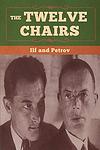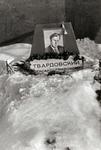The Greatest Soviet "Russia" Books of All Time
Click to learn how this list is calculated.
This list represents a comprehensive and trusted collection of the greatest books. Developed through a specialized algorithm, it brings together 300 'best of' book lists to form a definitive guide to the world's most acclaimed books. For those interested in how these books are chosen, additional details can be found on the rankings page.
Genres
The category of "Russia" in books typically encompasses literature that explores the history, culture, politics, and society of Russia. This can include works of fiction, non-fiction, memoirs, and biographies that delve into the complexities of Russian life, from the tsars and the Soviet era to contemporary Russia. These books may also examine the country's relationship with other nations, its artistic and literary traditions, and its impact on global events. Overall, the category of "Russia" offers a rich and diverse range of books that provide insight into one of the world's most fascinating and complex nations.
Countries
Date Range
Reading Statistics
Click the button below to see how many of these books you've read!
Download
If you're interested in downloading this list as a CSV file for use in a spreadsheet application, you can easily do so by clicking the button below. Please note that to ensure a manageable file size and faster download, the CSV will include details for only the first 500 books.
Download-
1. The Twelve Chairs by Ilya Ilf, Evgeniy Petrov
In this satirical novel, a former nobleman and a con artist form an unlikely partnership in pursuit of hidden treasure. After the Russian Revolution, fortunes are overturned, and the nobleman learns that his family jewels were sewn into one of the twelve chairs from a dining room set. As the chairs have been scattered by the new Soviet regime, the duo embarks on a wild chase across the USSR, encountering a colorful cast of characters and navigating the absurdities of the communist system. Their quest for wealth is a humorous reflection on human greed and the ironies of fate in a society undergoing radical change.
-
2. The Little Golden Calf by Evgeniy Petrov, Ilya Ilf
The book is a satirical novel that follows the adventures of a charming con artist in the Soviet Union during the 1920s. The protagonist, with a combination of wit, luck, and audacity, navigates through the absurdities of the Soviet bureaucracy and the remnants of the pre-revolutionary elite in pursuit of a mythical treasure. His journey is marked by a series of humorous episodes that expose the contradictions and ironies of the early Soviet society, ultimately offering a sharp critique of human greed and the folly of the era's political and social systems.
-
3. Forever Flowing by Vasily Grossman
The book is a poignant exploration of life, freedom, and the human condition, set against the backdrop of the Soviet Union after World War II. It follows the story of a former Gulag inmate who, upon his release, grapples with the profound changes in society and his own personal struggles. Through his journey, the narrative delves into the nature of totalitarianism, the resilience of the human spirit, and the search for truth and redemption amidst the oppressive political landscape of the time. The protagonist's reflections and interactions with other characters offer a deep meditation on the cost of war, the meaning of liberty, and the enduring quest for justice.
-
4. A Week Like Any Other by Natalya Baranskaya
The novella chronicles a week in the life of a Soviet woman, Olga, who juggles her demanding career as a research scientist with the relentless responsibilities of domestic life. Despite her intelligence and hard work, she faces the constant struggle of balancing her professional ambitions with the expectations placed upon her as a mother, wife, and daughter-in-law. The narrative provides a poignant and realistic portrayal of the societal pressures faced by women, highlighting the gender inequalities and the double burden of work and family duties that many women endure, all set against the backdrop of mid-20th century Soviet society.
-
5. Vasili Tyorkin by Alexander Tvardovsky
The book is a classic Soviet-era narrative poem that follows the eponymous character, an everyman soldier, through his experiences on the Eastern Front of World War II. With a blend of humor, pathos, and folk wisdom, the protagonist embodies the resilience and resourcefulness of the Soviet people during the war. Through a series of episodic adventures, the poem paints a vivid picture of life on the front lines, capturing the camaraderie among soldiers, the hardships of battle, and the indomitable spirit of the protagonist as he navigates the brutal realities of war with wit and cunning.
-
6. Sandro From Chegem by Fazil Iskander
The book is a satirical novel that follows the life and adventures of Sandro, a charismatic and larger-than-life character from the Abkhazian village of Chegem. Through a series of humorous and poignant anecdotes, the narrative explores the cultural and social dynamics of Soviet life, delving into themes of power, tradition, and the absurdity of bureaucratic systems. Sandro's escapades, which often challenge the status quo, offer a window into the complexities of life in the Caucasus region, blending folklore with political commentary and providing a rich tapestry of human experience that celebrates the resilience of the human spirit in the face of oppression and change.
-
7. House On The Embankment by Yuri Trifonov
The novel delves into the lives of Soviet intellectuals and bureaucrats during the Stalinist era, focusing on the residents of a prestigious Moscow apartment complex. It explores the complex interplay of personal and political loyalties, the impact of political purges on individual destinies, and the moral compromises made by those seeking to navigate the treacherous waters of Stalinist society. Through the protagonist's reflections on his own past and the fates of his neighbors, the narrative reveals the intricate web of betrayal, guilt, and memory that binds the community, offering a poignant examination of the human cost of political oppression.
-
8. Grey Is The Colour Of Hope by Irina Ratushinskaya
This book is a powerful memoir of resilience and endurance, chronicling the author's experiences as a political prisoner in a Soviet labor camp during the 1980s. The narrative captures the harsh realities of life behind bars, from the brutality of the guards to the solidarity among the female prisoners. Despite the oppressive environment, the author finds strength in writing poetry, a testament to the human spirit's capacity for hope and creativity in the face of despair. Her lyrical prose weaves together personal reflections, vivid descriptions, and poignant insights, offering a moving account of her struggle for freedom and the triumph of the will over totalitarianism.
Reading Statistics
Click the button below to see how many of these books you've read!
Download
If you're interested in downloading this list as a CSV file for use in a spreadsheet application, you can easily do so by clicking the button below. Please note that to ensure a manageable file size and faster download, the CSV will include details for only the first 500 books.
Download





